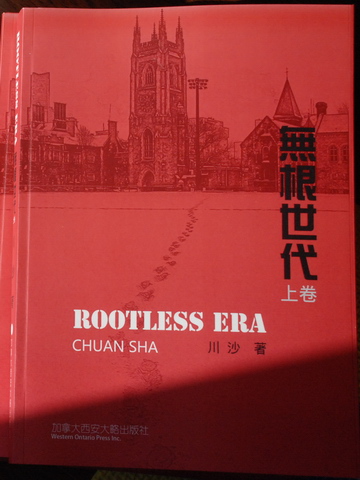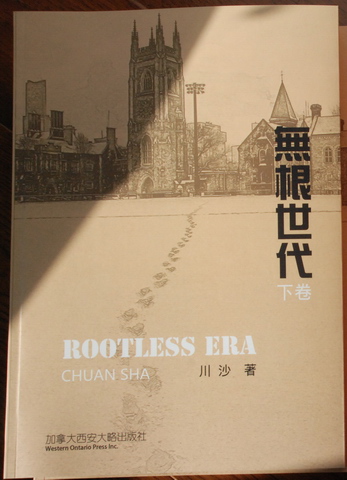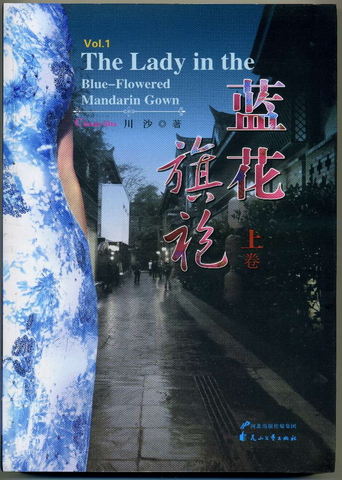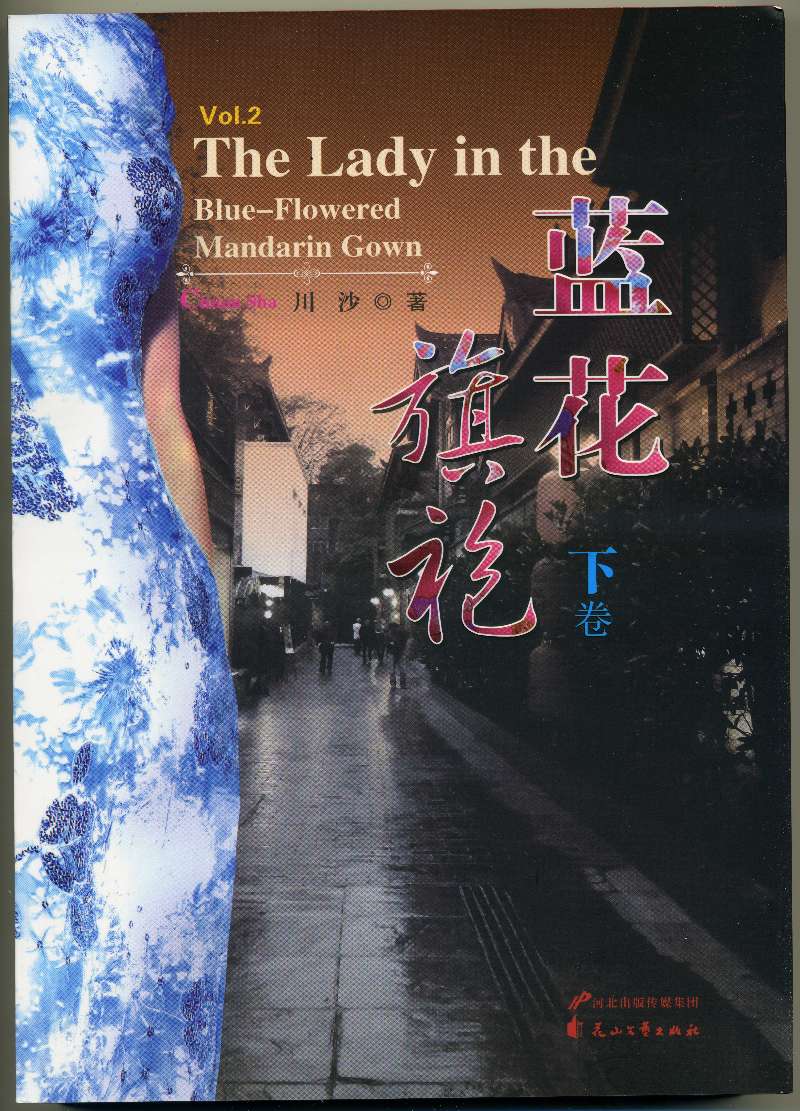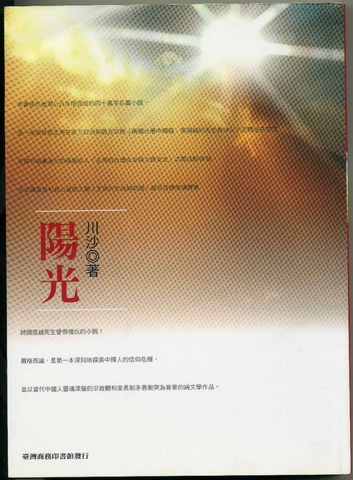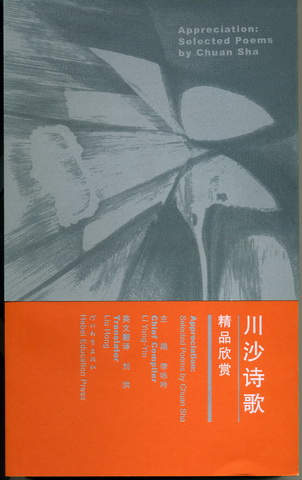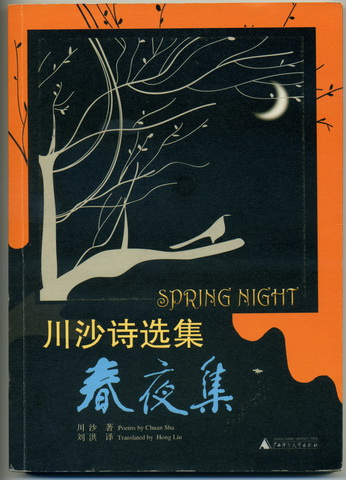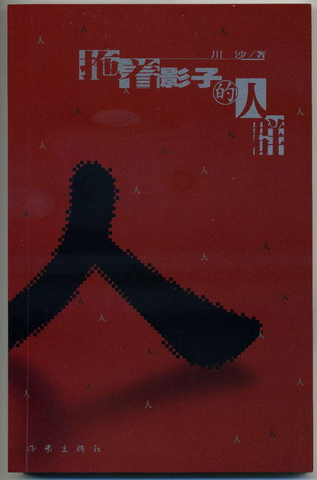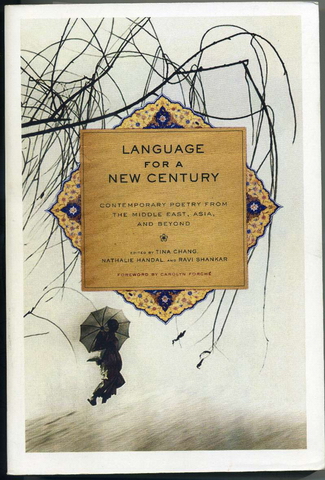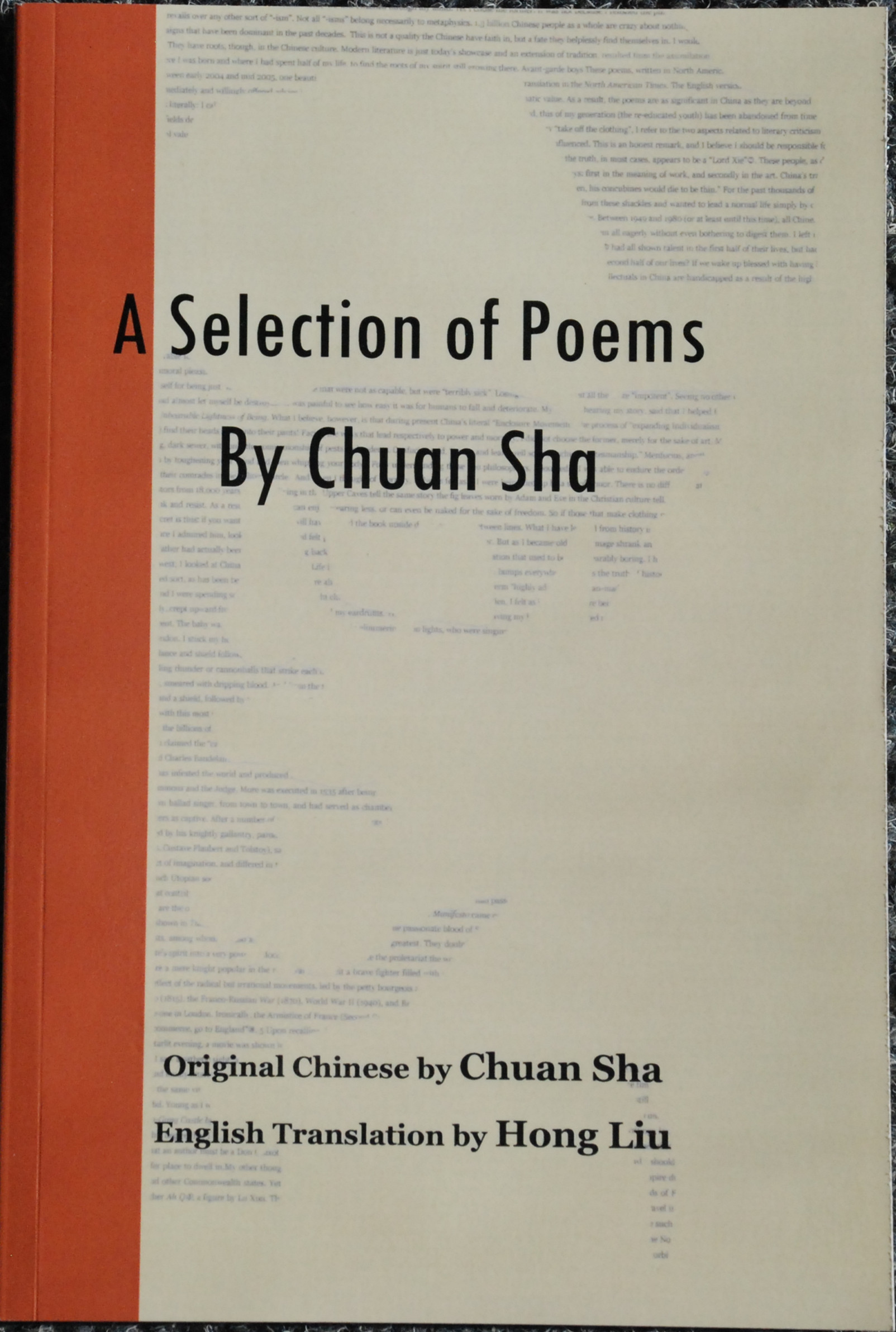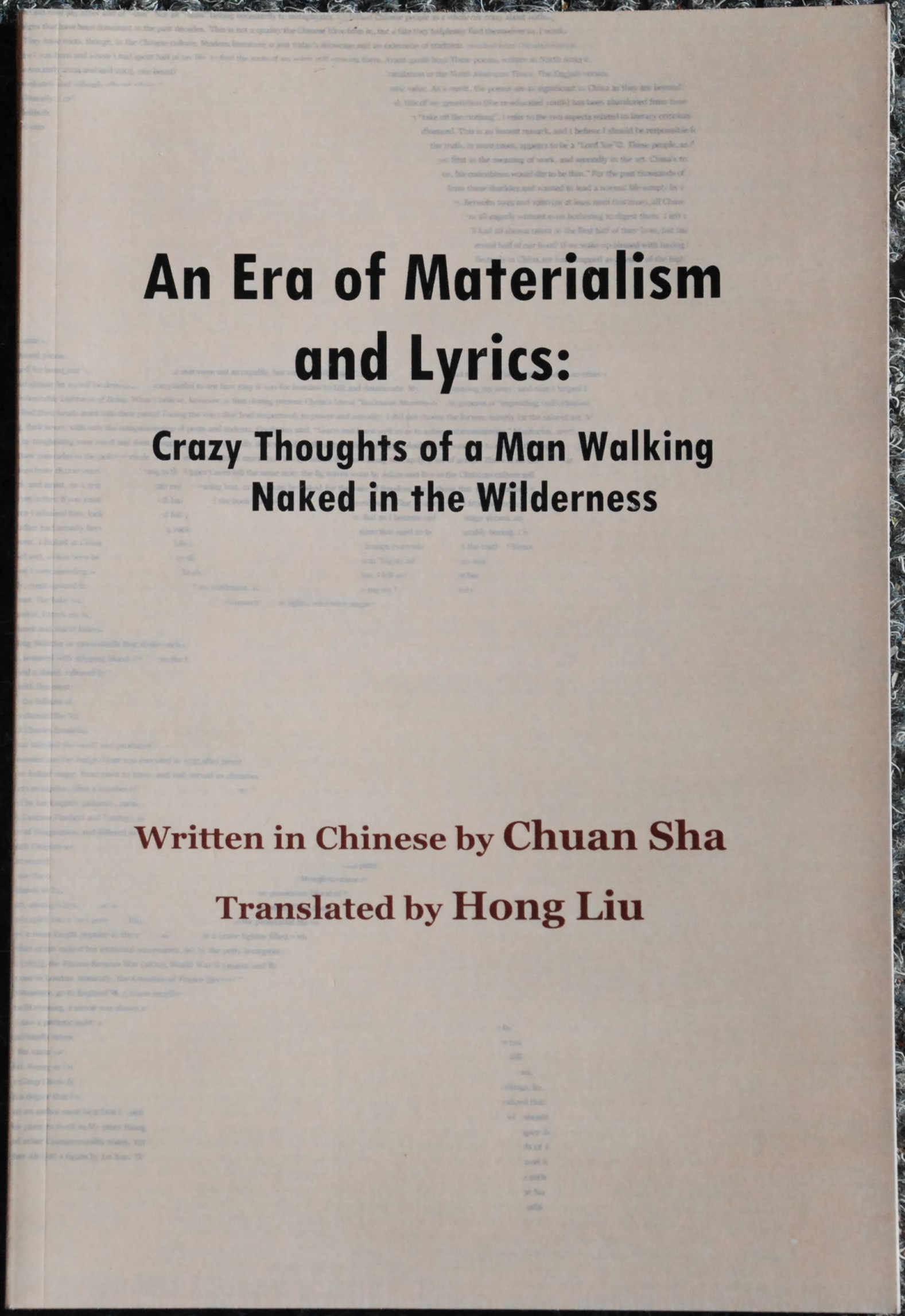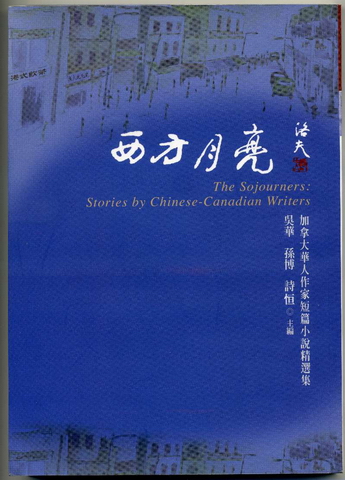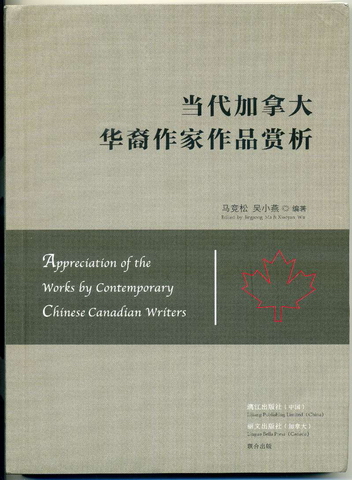川沙 1995年秋 英国伦敦
(原载2004年6月台湾水牛出版社同名短篇小说集《西方月亮——加拿大华人作家短篇小说集》)
Translated by H. Laura Wu and Cory Davies
“A Western Moon” was originally serialised in a Toronto Chinese language newspaper and included in The Sojourners: Stories by Chinese-Canadian Writers in 2004.
一
“哟!多么漂亮的小狗! ”
刚刚上了列车入坐的唐谦,看着对座的漂亮女人脚下那条昂起头来,两只眼睛亮晶晶地盯着他狺狺着声的小狗,一条全身拖着长长白毛的哈巴狗那憨憨的样子,禁不住地轻呼起来。
“谢谢!哦——非常感谢!”
看着面前英俊的高个子黄皮肤男子欣赏着她的小狗,漂亮的白种女人高兴得连连地感谢着。
“清晨的空气真新鲜啊!”
“是的,清晨的空气让人神清气爽。”
“到伦敦?”
“是的。”
“您是日本人?”
“不,不是。”
“您——您?”
“我——我——哦!我……我从……我从中国来。”
唐谦答非所问地回答着女人的问话。那时,他看着那只确实逗人喜爱的哈巴狗 正慵懒地拱起两只前爪,歪着身子依憩在女人的两腿之间,哈巴狗和那同样漂亮而又玲珑富态的女人适成呼应,在车厢里温柔的灯光下,婉如一幅莫奈的温馨可人、呼之欲出的油画里的景象,他不禁在心里感叹着西洋人的爱狗,又想起了那句在中国人心目中恐怕认为简直是有点岂有此理的西洋人关于狗的名言来,那就是:Love me,Love my dog.进而,他又想起了最近他正在研究的《浮士德》歌剧里,那条走进了浮士德书房里去的魔狗,那个可怕的Mephistopheles*的化身,那个……他正在顺着意识边往下想,边回答女人的问话时,他又听到女人的声音在对他说道:
“哦!中国——多么美丽的地方!那儿,那儿好象,好象是靠近坦桑尼亚……好象……好……”
“……?……!?……!!!???”
“哦!不是——那儿好象是靠近……好象是靠近埃塞俄比亚……”
那时,唐谦有些坐不住了。他不好意思再去面对面地看着她。他怕他对座那个全身珠光宝气的女人看见他尴尬的目光。他怕毁了眼前的一切。本来,他一边和她说着话时,一边出自潜意识本能的引力,暗自在拿眼乜来斜去细溜着她的外貌:
首先,是她长着金发的头颅,白色大理石雕像般轮廓分明的前额下,一对深蓝色美丽的大眼睛。有些让他感到不协调的是,她的那些什么鼻子上挂着的金色鼻环,耳朵上吊着的耳环,甚至,连两边眉梢的皮肤上,都穿刺着的几个细小的金光闪烁的圆环。那是一些和他内心深处早期的传统教育有些悖离的东西……
即便,刚才那句在他听起来像是出自于《天方夜谭》之类——那时,他几乎仍是不相信,是他刚才亲耳听到了那样的一句出自于那个女人之口——的疯话,简直就象在他的心口上血淋淋地扎了一刀的话语,他仍是在出于潜意识本能引力的惯性之下,要去看几眼,那个可能已自知失言,脸上好象已经露出尴尬之色——他自己的感觉——的女人的脸:她的非洲女孩似的,编得铅笔头般粗细的满头金蛇样的小辩子,雪白的脖子,顺着脖子看下去,在白绸低领口正中,若隐若现地凸了出来的一对颤颤的乳房;深深的乳沟上方,在脖子上金项链上边挂着的,金光闪闪的十字架;袒露着的丰腴的双臂,她的在他们之间那张小桌上,用优雅高贵的淑女姿式端着带托盘的咖啡杯那双在手指头上戴满了金银戒指的手,手指上那些涂着闪射着紫色银光长长的指甲。
“你知道Chow吗?”
“Chow——什么Chow?怎么拼读那个单字?”
“Ch——Ch——Ch——Chow!”
“不知道,Chow是什么”
“那是一种中国狗——”
“中国狗?”
“是的!”
“Chow——Chow——Chow是一种中国狗?”
“是呀——Chow是一种中国狗!Chow的毛不长,是黄色的,Chow的个头也很小。”
“是吗?”
“哦——对啦!戴卫也是中国狗!戴卫是一只Pekinese,Pekinese也是一种中国狗。”
“是吗!?”
唐歉心里有些吃惊,又有些无可赖何地回答着女人的问话。他看见她又用她的手去摩裟着哈巴狗的头皮,脑子里才明白过来它的名字叫戴卫,而戴卫是一只北京狗!Pekin——Pekin——Pekin不就明明是北京吗?Pekin——ese——Pekinese——Pekin这个地名加上后缀ese,天哪!怎么会这样去取名!?他妈的!他妈的八国联军——他妈的八国联军之首的英国人——他不禁在心里愤怒地咒骂了起来,他想起来大不列颠博物馆里那些从中国抢去偷去的中国文物,他在拍卖行里买来的那些慈西太后当年委托英国人印制的邮票,还有香港……他妈的!他妈的!Pikenese——Pekinese!什么他妈的Pekinese!滚他娘的英国人的蛋!
然而,女人的摩裟着哈巴狗头皮的手却在他眼前晃来晃去……
唐谦想起了拉菲尔画笔下那些圣母的手,象雪白如玉的玉兰花瓣似的。只是,只是眼前这双手,如果除去了上面的什么金子银子之类的玩意儿就好了……
“还有Bulldog,Alsatian,Poodlie,嗯……嗯……还有……还有Collie,Husky……?对啦!是叫这个名字,是叫Husky!是爱斯基摩人拉雪撬用的狗,它是叫这个名字,还有Borzoi,Afghan,当然,当然还有,当然还有跑得最快的Greyhound了,乖乖!我差一点把它给忘记了……”
二
那时,唐谦侧过了脸去。
他借着列车上明亮的灯光,看着女人反射在急驶的列车车窗上黎明的黑暗中有些模糊的镜像。那时,他想,他是极不情愿让她看到,或是感觉到:他已经看到,或者是感觉到了,在她脸上的尴尬。因为,当他听到了女人的那些话时,无论他心里有多么难受,他都极不情愿去惊动她,去打扰他面前的兴致正隆,而又让他心仪的,楚楚动人的漂亮女人。
原本,他心想:这是一个多么美妙的旅程啊!黎明即起,拂晓出门,当脚下咯咯咯咯的脚步声,伴随着在自己行走过的路灯下时长时短地变化着的影子,响彻在王子大道的石板路上时,抬头望着山间那些错落有至的古老石头建筑群,目光顺着盏盏昏黄的路灯辉映下的古老石板路蜿蜒向上,游移在那些什幺荷里活皇宫、圣查尔斯大教堂、军堡山那些朦朦胧胧的夜影中……
那时,他想起去年秋天的一个元月晚。军堡山上,伴着交响乐的旋律,在夜空中飞曳起舞,噼噼啪啪嘶嘶嘶嘶发出声响的光焰四射的礼花,尤其那些象中国的黄桷树瀑布,或者加拿大的尼亚加拉大瀑布似的,从军堡山上那些一排排箭垛凹口处倾泻而下银光闪闪的液状礼花。一簇簇礼花的彩光里,欢呼雀跃的人群,那些笑得一朵朵夜百合般孩子们的脸蛋儿。那时,他的目光,又顺着圣查尔斯大教堂的尖顶,投向夜空中那一轮如镰似的银月。他在黎明微亮的夜色里昂起的头颅,他优雅修长雕塑样的身影,静静地伫立在王子大道通向火车站那条路口一排花园铁栅栏前。他仿佛凝固在了那儿。
看着夜空中那轮飘飘浮浮似升又似落的又大又透亮的月亮,他在心里轻声地呼喊:啊!多幺美妙的月亮啊!多幺典雅的月亮!到底是英国的月亮!到底是欧罗巴的月亮!到底是西方的月亮哦!
那时,他看着月光下象是镀了一层淡银似的城堡,这座他心目中,欧洲所有城市里最典型最美丽的古堡城市,他恍惚感到自己尤若置身在莎士比亚那些美雅而又庄严的戏剧里。他感到,他自己就是那其中的一个什幺角色。而且,是一个美妙角色,一个妙事连连幸运的角色……
你看,可不是吗?你看这一脚踏进车厢,你看这眼前,呵!你看这眼前,可不是吗?这是一位多幺美妙的可人儿哦!一个多幺诱人的欧罗巴尤物哦!那可不!天啦!多幺美妙的一个拉菲尔笔下的安琪尔!
这是一个多么美妙的旅程啊!一大早上车刚落座,就撞上一个这么漂亮的女人!
可是……可是……
可是,为什么?她口里……为什么老天要让她从的口里突然冒出来那么一句话来,那么一句简直是岂有此理《天方夜谭》似的疯话来呢?!
三
“哦——你看!它睡着了!”
“嗯。”
唐谦看见全身伏了下去的哈巴狗歪着脑袋闭上了眼睛。
突然之间,他发现,那哈巴狗确实是在哪里见过。
……是的,是见过!他猛然想了起来:这不就是“京巴儿”吗?是呀,是“京巴儿”呀。明明就是嘛!你看,可不是嘛,它毛还这么长。哎……这眼睛,只是……只是这东西出现在这里,又牵在这如此珠光宝气的英国女人手里,才把人搞糊涂了。这北京胡同里的东西,怎么跑到这里来了?奇怪,真是奇怪!有什么奇怪的,你不也是中国的人吗?你怎么跑到这里来了?真是的。种族歧视,中国人为什么就不可以跑到英国来?自己看不起自己?又还物种歧视!人可以出国,狗为什么就不可以跑到这里来?哎……是呀,时代不同了,时代不同了,人可以出国,狗也可以跟着人出国呀……哎,“京巴儿”,真是它,真是“京巴儿”啊。不是吗?前几年,北京好些人开始养宠物的时候,一些人家里养的,不就是这种狗吗?是的,对啦,确认就是它了!没错,就是这种狗!冒出这种狗的过程,记得,好象先是香港导演李翰祥在《火烧圆明园》里,让刘晓庆在慈西太后的宫殿里边牵了出来。对了,确实就是那样。然后,北京城的好些四合院,胡同里,大街上,就到处都钻出来了这种东西。这不,就跟眼前这家伙一个样:白毛儿,或者是黄毛儿长长的,这狗杂种,就是四个爪子站直了,背上的毛都几乎要拖到了地上,说那长毛飘洒的样子,是承传了满清皇宫里巴儿狗的遗风。好了,现在彻底想起来了,这“京巴儿”……它的正名……“正名叫中国宫廷狮子狗,也叫京巴犬,还叫北京犬。实际上,好像它是中国一个古老的犬种,还有好几千年的历史……”哦……记起来了,记起来了……记得,这些文字,是前几年,一个关于狗官司的讨论会上,电视屏幕上出现的字幕……对了,是的,是电视上的字幕,狗官司,狗价钱,电视……电视?电视?电视……哦……想起来了,是出国前几年,是谈这狗……这种狗……谈抢狗……判刑……人和狗……狗的身价……京巴犬的身价?是的,是讨论京巴儿的身价,那是一次中央电视台法制栏目电视直播讨论会,从此,这京巴儿的身价就陡然升了上去。讨论什么?讨论一个人抢了别人一只价值五万圆人民币的“京巴儿”,应不应该被判刑入狱五至十年?主持人提问为:狗的社会学意义是什么?狗之附属于人的中西文化比较,抢狗和抢钱的区别?法学家呢,回答的是狗的市价,量刑限度。直播现场一些群众讨论的是:狗是什么?一致的看法为:狗在中国就什么都不是。狗就是狗,是狗杂种、狗X的、狗屁不通、狗不理包子、狗娘养的、狗腿子、打狗棒、狗头军师、狗嘴里吐不出象牙来、猪狗不如、狗屎!狗在中国,就和老鼠苍蝇麻雀一类,都是扯淡的下三滥一类,还扯到鲁迅,鲁迅的国骂什么的。总之,印象是,国人认为,狗就是狗,是下贱的,而绝对不是西方的什么Love me,Love my dog!电视直播里,那些镜头里讨论会上的群众还谈到,前些年,一些时候,政府的政策朝令夕改,今天号召养狗,明天又号召人民杀狗,弄得地方官员无所适从。而现实是,从古至今,国人都喜欢吃狗肉,走遍大江南北,尤其东北,很多地方餐馆里都有卖狗肉的,狗肉是一道好菜,所以,抢只狗的事情,纯属鸡毛蒜皮的小事,为此而把人关进监狱,未免小题大做,草菅人命!但是,法学家就不这样看了。在法学家眼里,狗是钱,那么,一旦是钱,事情的性质就变了。五万圆人民币,在那个年代,就是一笔巨款,在偷盗和抢劫罪里,算是“数额巨大”,是判罪量刑要件或重点。抢狗事小,狗可以卖钱事大。法制的时代,就是要按法制办理。结果是,那个倒霉的家伙,就真的被关进了监狱。因为他是抢劫,是“数额巨大”的抢劫罪,应该从重从严!于是乎,“京巴儿”的身价,通过那场电视辩论,立刻就在全中国范围内蹿上去了好几层楼……
……更早的,不知是什么时候,记不得是《城南旧事》,还是小时候看过的一部名字好象是叫做《野火春风斗古城》的片子里,也出现过那个样子的狗。而且,那狗还总是让那些阔太太或者是阔小姐抱在怀里,或者是用绳子牵在手上,狗脖子上还挂着叮铛着响的铃铛。他好象又更加清楚地记了起来,《野火春风斗古城》里,那个银环小姐手里,不就常常抱着一只那样的狗吗!记得,金环和银环都是由王晓棠一个人扮演的,而且,在他看来,王晓棠又至今都是他认为二十世纪中国形像最美的女演员,只不过,她生不逢时,没有象今天刘晓庆和巩丽那样,在一些大片里演出而已罢了!若是要论起形象来,什么刘晓庆、巩丽,什么日本的篥原小绢、山口百惠,什么台湾的林青霞,香港的什么什么名字都让人想不起来的,那些在武打片里装神扮鬼的歪瓜劣枣,就更加等而次之了……
……一次在乌鲁木齐,出席他一个朋友的小说改编的电影毛片招待会时,当他和外景地回来的电影中女一号正在讨论着一个什么问题时,一个满脸横肉的日本道演突然插嘴问他:亚洲的女演员谁最漂亮?结果是争来争去,最后在餐桌上,喝得醉熏熏的日本人哭着说他是审美观上的大国沙文主义!因为,他说了山口百惠没有王晓堂长得美,又说了中国有十多亿人,你日本国一个弹丸之地的海岛上才几个人,按照数学上的概率论来说……之类的话。实际上,他心里明白,只不过日本人见他和女一号多说了几句话而已,而恰恰日本人不知道,那女孩和他是老乡,是他生活的那座城市歌舞团里的一个演员,早就五体投地地崇拜着他……他发起了狠,和那女孩约好了戏弄日本人,回回日本人去纠缠那女孩的时候,他们几个男的就捣乱,有一次,日本人自以为是日方导演呈威风的时候,他居然把那女孩从日本人身边抱了过来,放在自己的大腿上坐着,女一号还就势调头用手勾住他的脖子,通红的樱桃小嘴在他脸上劈里啪啦地吻将起来……
……他想起他的只在影集里发黄的照片上见过的大伯来,那是一张二三十年代济南“泰山照像馆”拍的照片,二十来岁的一个头上梳着分头,脸上戴着圆形金丝边眼镜,身着西服领带的大个子英俊书生,抗日战争时期被日本人的飞机炸死在早春二月村头的流沙河边……大伯毕业于曲阜师范和北京大学,至今,泰山上的一块巨石上,还镌刻着芦沟桥事变之后,他题写的那两个淳厚苍遒的宋体大字……
……有一年回老家时,他的同父异母的姐姐领着他,在黄昏沧茫的暮色中,他怀着敬畏的心情,仰望着山腰巨石上的“补天”两个凹进了石壁,仿佛有灵魂的大字时,他被震撼得完全不能自持的心情……
“你知道,Chow和Pikinese有什么不同吗?”
“不知道。”
“Pikinese的个头比Chow还要小一点,但是毛要长得多,Pikinese的毛是白色的,Chow的毛是黄色的。”
“嗯。”
Pikinese——Pikinese——他妈的!这女人还有完没完?他在心里咒骂着,又自我解嘲地想到:
八国联军是她曾祖父那一辈的事儿了,更何况,她曾祖父是不是八国联军中的一份子都还是一个问号,我何必要跟她过不去,又跟自己也过不去呢?何况……何况,何况她又是那么漂亮……
四
前几个月,也是在这趟列车上,也是从爱丁堡驶往伦敦,时间也是在清晨5点30分,他准时上车落座后闲聊起来的,也是一个对座的女孩,只不过,那女孩一点都不能吸引住他的注意力。因为,他觉得女孩太瘦了,一脸雀癍,眼睛倒是大大的,只是她的脸,让他想起伦敦的大不列颠博物馆里那些埃及少女木乃依的棺木表面上,用古代的彩色颜料画在上面死者生前的容貌。美倒是无可挑剔的美,只是让人感觉到那是画,是艺术品,是古董,是人制造出来的,而不是人本身。那上面没有生命的气息,而只能让人看到死亡的阴影。看着女孩前额上,手背上几乎是没有脂肪层的簿如白纸的皮肤,皮肤下面根根发叉的树根似的青的紫的血管和经络,瘦削的肩胛,木材棍似的手、腿和整个身体。那样的身体,不仅让他想起杜甫“清辉玉臂寒”的句子【1】。当然,他也知道,家乡人说的“南瓜白菜,各有所爱”,更同意苏东坡的“短长肥瘦各有态,玉环飞燕谁敢憎。”但是,他还是不喜欢过于瘦削的女人。他无法理解,为什么西方人今天会那么热衷于减肥,直减得一个个美女骨瘦如柴,特别是那些在镁光灯下面,一个个与其说是穿著,不如说是撑着,或者是说顶着各式各样漂亮衣服的骨瘦如柴的模特儿们。他知道,那是电视时代带来的毛病,是一种时代审美病。正常人在电视画面上显得稍胖,为了纠偏,在电视画面上,要看见人们在日常生活中正常人的样子,就需要上镜头的人,他们的身体更加瘦削。现代生活,尤其是明星和模特们,都是在电视画面上和公众见面,于是,上镜头的人,就都需要减肥,或者说瘦削。于是,明星引导大众,减肥就成为了时代的审美,成为时髦。但是,一个男人,一个生活中的男人,他怎么和一个几乎难于生产的瘦削女人生活呢?男人审美需要女人的曲线,瘦削如干材棍似的女人,还有什么曲线呢?
时常,在海滨浴场,特别是在德国,法国和西欧那些比较开放的国家天然浴场,他特别喜欢蓝色天空下翻着白浪的大海边沙滩,以及沙滩上,那些沐浴着明艳阳光的头上戴着花花绿绿遮阳帽,脸上戴着墨镜半裸或全裸的,身上晒得黑里透红的姑娘们,特别是那些长得结实的,丰腴的,S曲线高高地凸起的,说得斯文一点含蓄一点绘画语言一点,就是女体中段的乳房和臀部长得夸张一点,说得通俗一点直白一点,就是女人的奶子和屁股长得更大一点的女人们。
“Do you think it’s a boy or girl?”
女人的眼光甜甜地抚摸着他的脸,笑迷迷地问道。
“嗯——嗯——girl吧!它一定是个Girl!”
“不——不——不是!哈哈,哈哈哈,哈——哈——哈——它不是Girl!它是boy!哈哈哈,哈哈哈,哈——哈——哈——”
女人哈哈大笑起来,笑得全身都颤动着,一对大大的乳房半遮半掩在白色低领口的衬衣里滚来滚去。他开始感到身上有些什么热热的东西升了起来……
脑海里有那么一瞬间 ,他想起了几年前在北京开文学讨论会时,那个胖胖的山东老乡的军队作家。他最近几年写的一本长篇小说,那本小说的名字就叫做《丰乳肥臀》,一想起那书名,再一想起他那张胖胖的脸,那张脸上宽大的前额下,两撇八字眉遮掩着细眯细眯豌豆角似的一对单眼皮的眼睛时,他就想笑。那时,在他脸上,真的咧开嘴巴笑了起来。
他们两人,都在那儿捂住了嘴巴笑了好一阵子。听着他们的笑声,狗也汪汪地叫了起来。狗越叫唤,他们就笑得更欢……
时间长了,他还真佩服他老兄那四个字概括,可以说深得中国古文言文之精髓。对比女人前挺后凸的描写,乔伊斯在《尤利西斯》里最精彩的句子为:“她身子前面突出两个尺寸可观的大肉疙瘩,大得几乎垂进午饭的汤盆里,背后下身也有两个隆起的东西,直肠一定是结实的,那两个鼓包摸起来,一定很有快感。”【2】两相对照,后者显得雍长累赘不说,还缺乏艺术感,简直就是生理学教材语言般的叙述。
他想起来,他们讨论法国新小说流派作家克劳德.西蒙的《弗兰德公路》,研究他的写作手法,又奇怪于为什么瑞典人要把1985年的诺贝尔文学奖桂冠扣在他头上。他的小说时空颠倒了又颠倒,几十百把个字一口气写了几个段落不打一个标点符号,大段大段让人看得心烦意乱,几页看下来不知到情节扯到了那里去了,还美其名曰“诗画结合的新小说”!也许是俺们太古典了吧,就像当年毕加索的画不能被人接受一样。乳房长在了肩膀上,屁股长在了肚子上,眼睛却从全身到处长了出来……
五
“你知道坦桑尼亚的天然动物园吗?”
“嗯——嗯——”
“你应该知道的,坦桑尼亚离中国那么近,那个天然的动物园里……”
“嗯——嗯——”
见你的鬼去吧!唐谦在心里又咒骂了起来,这女人是怎么搞的!她怎么这样的无知!一会儿把中国扯到了非洲!一会儿又连Pikinese这种北京狗为什么是中国狗她都不知道!她恐怕连北京都不知道吧!他妈的!中国什么人才会不知道伦敦呢?他简直不愿再往下去想了……
他闷闷地一言不发。
眼睛,眼睛却老是要去偷偷地瞟几眼她的耀眼的鼓鼓的胸部,两条粉白粉白胖胖的手臂,时不时地,他还要向下乜斜了眼溜几溜她的黑色短裙下面,两条穿著刺眼的粉红色的高根鞋的,套着黑色透明网眼连裤袜的诱人的大腿……
《丰乳肥臀》!《丰乳肥臀》!眼前的女人不正是这样的一个“丰乳肥臀”的女人吗?
对座女人的位置上,他的眼前却老是浮现出上次那个瘦瘦的女孩的形像来。女孩家住在伦敦城里,她在爱丁保大学经济系念书,那次,她是回伦敦城去。和她讨论文学是讨论不下去的,除了沙士比亚和D.H.劳伦斯以外,其它的英国作家她是一概不知的!即便是D.H.劳伦斯,她也是因为那几天BBC电视台播放了《查泰莱夫人和她的情人》的电视剧之后,社会上因为里边的太多的裸体镜头引起了首先是中学生家长和教师,然后是教会组织,再然后是社会上观念较为保受的人和年龄较大的人士激烈的反驳,在报刊杂志和广播电视上爆发了论战,战火一直烧到了她的教室,寝室里之后,她才知道原来那个作家就是英国人。更为好笑的是,她竟然是诺丁汉都伊思特伍德人,居然和劳伦斯是真正的老乡!要是劳伦斯在九泉之下有灵,不知道他会作何感想?也可想象得到今天一些英国青年人,他们对于文化的无知,已经到了何等样的程度!他记得那个女孩在谈到电视剧给她的印象时,言谈中,不时流露出对扮演女主角的演员的羡慕。
清晨的空气中,除了热咖啡的香味之外,浓浓地散发着女人身上的香水味儿,那是一种带着树林里植物散发出来的清香的香水味儿。由于是早班车,上面稀稀落落地没有几个人。在他们的那一段,就只有他和那个女人。
唐谦看着车窗外渐渐开始有些发白的模模糊糊的景色,上面段段续续明明暗暗地拼凑和拆裂着女人的身影,耳边还传来女人喋喋不休的话语:
“……森林里,有许多的大象,老虎,熊,Grizzly Bear,Baboon,Chimpanzee,狮子,狐狸,狼,猫头鹰,Boa Constrictor……”
有一阵子,他看着镜面般车窗上流动的画面。他看见车窗上,女人的鼻子和前额、被一些外面小站上射来流动的光点交替地拉长和缩短着……有一忽儿,她隆起的乳房和金发的后脑勺竟朝前后两个方向被拉长着:隆起的乳房朝着前方,一把闪着银光巨大利剑似的,刺向远处那些黑黝黝的苏格兰田野和树林;向后拉长的后脑勺,则象一大把长长的金发,拖曳在黎明的夜空中飞舞……
“……Rocodile,野牛,鹿,Giraffe,Zebra,African Buffalo……”
Rocodile!R-o-c-o-d-i-l-e?Giraffe?Zebra……非洲的Buffalo?B-u-ff-a-l-o……他在脑海里搜寻着女人嘴里冒出来的英文单词……他感到,他对那些表示着遥远陌生的非洲野生动物的英文单词有点无能为力……
文革期间,他生活的那座城市搞武斗时,他躲藏在另外一座城市的亲戚家里看了一本名字叫着《非洲内幕》的书。一个十来岁的小孩的他,确实在那个时候浮想联翩地梦幻着东非洲坦桑尼亚的天然动物园,他梦幻着有一天要到那里去看一看,去看一看那些什么大象,老虎,狮子,长颈鹿,斑马,鳄鱼……但是他得坐在吉普车里去看!因为书里说,在那里,人是反过来被关在笼子里……英国人,法国人,美国人,他们躲在吉普车里用毛瑟枪射杀那些动物……站在树林里不让吉普车开动的大象和长颈鹿……躲在一棵巨树上过夜的少女时代的伊丽沙白……多年以后,他又看过那个叫约翰.根舍的美国记者写的《亚洲内幕》,《欧洲内幕》……但是,给他印象最深的,还是《非洲内幕》……
漂亮的女人还在那里用她高贵的伦敦腔述说着什么……
他的耳边已经听不进去女人的任何一句话。
任何声音,在那个时候,都变成了一句话,那句话就是那个女人先前说的:
“哦!中国——多么美丽的地方!那里好象是靠近坦桑尼亚……”
体内的烦躁,女人的话,让他渐渐地堕入尴尬和失望,愤慨和懊恼,无可奈何而又忧郁无助的深海里……
“哦!中国——多么美丽的地方!那里好象是靠近坦桑尼亚……”
“哦!中国——多么美丽的地方!……”
“哦!中国——……”
“哦!……”
…………
女人的话嗡嗡嗡地不停地在他的耳边响着,一直响到了列车到达了终点站的伦敦。一直响到他走出维多利亚中心车站。一直响到了他钻出了地铁来到了飘着小雨的圣梅耶路潮湿的空气中……
他,已经记不得,他是怎样和那个女人,由那可怕的把中国扯到非洲土地上,扯到坦桑呐尼亚,扯到埃塞俄比亚旁边去的话题转移到了其它的话题上去收的场!
然而,好多天都过去了,那句可怕的话,说话的女人高贵而又纯正的伦敦腔,她可怕的漂亮而又性感的容貌和身子,还有飘散在爱丁堡秋晨的空气中,混杂着咖啡香味儿和她身上散发出来的香水味儿的一种特别的味道,所有那些,好多天都一直伴随着他,让他记忆犹新,历历在目。
“哦!中国——多么美丽的地方!……”
“哦! 英国人!我的老天!”
注:
【1】语出:杜甫诗歌《月夜》:今夜鄜州月,闺中只独看。/遥怜小儿女,未解忆长安。/香雾云鬟湿,清辉玉臂寒。 /何时倚虚幌,双照泪痕干?
【2】语出:詹姆斯.乔伊斯《尤利西斯》第二部第十五章下卷第583页(刘翔翻译版)
A Western Moon
Chuan Sha
Translated by H. Laura Wu and Cory Davies
“A Western Moon” was originally serialised in a Toronto Chinese language newspaper and included in The Sojourners: Stories by Chinese-Canadian Writers in 2004.
1
“What a cute puppy!”
As soon as he sat down, Tang Qian noticed the little dog at the foot of the pretty woman facing him. It was a Pekinese with long white hair. Head lifted, bright eyes fixed at him, and barking excitedly, the dog had such an air of sweet innocence that Tang Qian exclaimed in admiration.
“Thank you! Thank you very much!”
Seeing a tall and handsome Asian man admiring her little dog, the Caucasian woman responded happily.
“The early morning air is really fresh!”
“Yes, it is very refreshing, indeed.”
“Going to London?”
“Yes.”
“Are you Japanese?”
“No, I’m not.”
“And?”
“I… I…. Oh, I… I came from China.”
Tang Qian evaded the woman’s question as best as he could. He turned his gaze back to the adorable dog, who languorously raised its fore paws and smugly wedged its torso between the woman’s legs. The dog and its equally attractive and curvaceous mistress made a perfect pair. In the soft light, they looked just like a scene from a Monet painting, lovely and lively. The image made Tang contemplate the incredible affection Westerners lavished on their dogs. It also reminded him of their maxim, “Love me; love my dog,” which sounds preposterously ridiculous to the Chinese. Then he thought of Gounod’s opera Faust, which he had researched recently, especially that magic dog who ambled into Dr. Faust’s study, a metamorphosis of the dreadful Mephistopheles … He was deep in his own thoughts while trying to follow his companion, then, he believed he heard her voice, saying: “Oh China! A beautiful land! It… it seems to be… close to Tanzania… maybe… might…”
“…? …!? …!!!???”
“Oh no! Not Tanzania. China … might be near Ethiopia…I think…”
Right there and then, Tang Qian felt too embarrassed to face squarely the woman sitting opposite him, sparkling with so much jewellery. When chatting with her, he was stealing glances at her, sizing her up slyly because he couldn’t resist the impact her beauty exerted on him, on his sub-consciousness. Her blond hair, her beautiful, big, blue eyes beneath a finely chiselled forehead smooth as white marble. What he found out of place on her were the gold nose ring, the earrings, and the few tiny, shining rings piercing through the fair skin at the end of her eye brows. Those were things contradicted the values that a rather orthodox education ingrained in him during his formative years and that he cherished deep in his heart. Such frippery…
The remark (he couldn’t believe it had come out of her mouth if he had not heard it himself) sounded to him like fanciful words from One Thousand and One Nights. It was like a digger being thrust into his bleeding heart. She must have sensed she had made a stupid slip of tongue and she appeared uncomfortable, or could it simply be that he was overly sensitive? No matter what it was, instinctively aroused by a natural response to her beauty, he still found himself helplessly glancing at her: the gold snake like blond braids, each as thick as a pencil, a hair style favoured by African girls; snow white neck, along which his glance moved downwards and fell on the low-cut neckline of her white silk blouse; quivering breasts partially covered and a visible cleavage, above which dangled a gold cross on a gold necklace hanging around her neck; bare and plump arms; hands wearing gold and silver rings, with which she held a coffee cup and a saucer, with lady-like daintiness and elegance, over the little table between them; long fingernails painted with metallic, silvery purple nail polish.
“Have you heard of chow?”
“Chow? What chow? How do you spell it?”
“Ch… ch…ch…c-h-o-w, chow!”
“No, I have not. What is it?”
“It is a Chinese dog…”
“A Chinese dog?”
“Yes!”
“Chow… chow…chow is a Chinese dog?”
“Yes, chow is a Chinese dog! Chow is short-haired, yellow, and rather small too.”
“Is that so?”
“Oh, yes! David is also a Chinese dog! David is a Pekingese and Pekingese is a Chinese dog.”
“Really?!”
Tang Qian, though reluctant and a bit dumbfounded, managed to keep the chat going. He noticed that she started to massage the dog’s head again and suddenly he figured it out: David was her dog’s name, and David was a Pekingese. Peking… Peking… Isn’t Peking Beijing? Peking… Peking…, Peking, the place name and the suffix ese, putting them together and you got Pekingese. Oh my god! How could they fabricate a word in such a way?! Damn! Damn you, the Allied Forces of Eight Nations1… Damn you, the British who headed the Allied Forces! Tang cursed angrily to himself. Then his thoughts turned to the Chinese artefacts in the British Museum, stolen or pillaged from China; the stamps that he purchased recently at an auction, stamps that Empress Dowager Cixi commissioned the British to produce (and they stole them!); and Hong Kong… Damn you! Damn you! Pekingese… Pekingese! Fucking Pekingese! Fucking British!
Yet, the hand moved back and forth right before his eyes, the woman’s hand massaging the dog’s head…
Tang Qian was imagining the hands of Madonna painted by Raphael, hands white as snow and semi lucent like pure jade, hands like petals of the magnolia flowers. Only if the hands in front of him were bare, without those gold and silver things…
“There are also bulldogs, Alsatians, poodles, and… eh, and collies… and huskies? Yes, huskies! I got it right, it is called husky! Dogs the Eskimos use to pull the sleds. Husky is the name. And Borzois, Afghans, and of course let’s not forget the greyhounds, the fastest running dogs. I almost forgot them…”
2
Tang Qian turned his face away to the window.
The bright lights in the train threw the woman’s silhouette onto the window, against the dark background of early dawn outside. On the window of the fast moving train, her image was blurred. He felt averse to let her notice or sense that he noticed, or rather sensed, her embarrassment. No matter how uncomfortable he was when he listened to what she was babbling about, he was reluctant to stop this attractive woman, who obviously was in a very happy mood, after all he enjoyed her presence.
When he first saw her, he had thought that this could turn out to be a marvellous journey! He had got up in the wee hours and left for the station at daybreak. While he was walking along Princes Street, the tap-tap-tapping sounds his shoes made resounded with the changing shadows of himself under the street lights, sometimes long and sometimes short. His steps on the paving slabs echoed in the quiet dawn. Lifting up his head, he looked at those ancient stone buildings aligning the hillside. His eyes were led upwards by the zigzagging cobblestone road that was lighted by the soft and yellowy street lights: shadowy outlines of the Palaces of Holyroodhouse, St. Giles Cathedral, and Edinburgh Castle appeared in the dark. Then, he recalled the night of the full moon last fall: the fireworks, to the rhythm of symphonic music, exploded, and danced, and flew, and glided in the night sky. The cascading fireworks plummeted from the parapet of the Castle, just like the waters of Huangguoshu Falls in China or Niagara Falls in Canada. He also remembered the cheering and dancing crowds, and the smiling faces of the children, those lily-like faces. Then his eyes glanced upwards along the crown steeple of St. Giles Cathedral and fixed on the silver moon in the dark sky. In the dim light of the dawn, he held his head high; he stood in front of an iron fence, behind which was a garden on Princes Street, which led to the train station. His whole body, tall, sinewy and graceful like a statue, was completely still, frozen or congealed. He stared at the stunningly gorgeous moon, rising and then falling. He exclaimed silently: “Ah, such an exquisite moon! Such a classical and elegant moon! Certainly a British moon! A European moon! A Western moon!”
Right then, he caught sight of the Castle, glittering as if silver-plated. To him, Edinburgh was the most beautiful city of ancient castles of all European cities. As if under a spell, he felt like he was in a Shakespearian play, a magical and sublime play; in it he was a character, a fine character, a lucky character to whom good fortunes befell…
Behold, didn’t it come true? You see, as soon as he stepped onto the train, here, right before his eyes, a glamorous beauty, a charming Europa, an adorable angel by Rafael!
What a wonderful trip it would be! An early morning train ride, by pure chance, sitting across from a goddess!
But…
How could she let such nonsensical words, as if out of One Thousand and One Nights, roll off her tongue?
3
“Look! He’s falling asleep!”
“Eh-huh…”
Tang Qian looked at the little dog, head tilting sideways, eyes closed, body entirely relaxed. All of a sudden, he realized that he might have seen a dog like this one before.
Yes, of course. He remembered, it was a few years ago when some residents in Beijing started to keep pets. Didn’t some raise this kind of dog? Yes, they did. Pekingese dogs became a fad because of a scene in a film, Burning of the Imperial Garden2 shot by a Hong Kong director Li Han Hsiang. Wasn’t it the scene in which Director Li had the actress Liu Xiaoqing, playing the part of Empress Dowager Cixi, walk out of a palace hall with a little dog at heel and on a leash? Then all of a sudden, Pekingese dogs emerged everywhere in downtown Beijing, with long, soft, white or yellow coats. Allegedly, the Pekingese originated from the palace of the Manchu Qing court, and carried an imperial pedigree. Its sale price increased because of a debate on live television: in a robbery attempt, a guy took someone’s Pekingese that had a price tag of 50,000 dollars in Chinese currency. Would the robber be sentenced to a prison term of five, or even ten, years? It turned out that the wretched man was indeed thrown into prison. He robbed and thus deserved a punishment, severe and swift. After that incident, the “value” of the dog skyrocketed again.
… He might have come across a Pekinese even earlier. He was not sure if he had seen it in My Memories of Old Beijing3 or in an earlier movie he saw when he was a kid, Battles in An Old City4. Whichever film it was, a Pekingese was in it, held in the arms of or pulled on leash by a rich woman or a rich girl, and wearing a tiny, jingling bell. Now his recollections became clearer: it was in Battles in An Old City. Didn’t Miss Yinhuan very often carry a Pekingese in her arms? He remembered the character and the dog because Yinhuan and her sister Jinhuan were played by the same actress, Wang Xiaotang, and in his opinion, Wang Xiaotang was the prettiest and most refined film star in twentieth-century China. Unfortunately she was born in the wrong time, years too early to appear in some of the blockbuster movies that made Liu Xiaoqing or Gong Li famous. However, Wang Xiaotang was much more beautiful than Liu Xiaoqing and Gong Li, or Komaki Kurihara and Yamaguchi Momoe from Japan, or Lin Ching Hsia from Taiwan. As for those Hong Kong actresses who often made fools of themselves in those gongfu movies, they were too homely and their acting was too amateurish to leave any impression on him; consequently, he could not even recall their names. You wouldn’t even mention them in the same breath…
He also recalled another film-related anecdote: it was in Urumqi, China. He attended a reception on a film set because the film was adapted from a novel written by a friend of his. There he was, talking with the lead actress of which film he now had no recollection, when suddenly a ferocious looking director from Japan rudely interrupted by asking him who was the prettiest actress in Asia. They got into a heated argument and later, at dinner, the Japanese, drunk as a skunk, howled that Tang was an aesthetic chauvinist. Apparently the accusation came about because of his statements that Yamaguchi Momoe, good-looking as she was, was no competition for Wang Xiaotang, and that China had a population of more than one billion while Japan, an island country as diminutive as a pellet, could support only a tiny population, and hence the law of probability did not favour Japan, etc. etc. He was well aware of the real reason for the director’s sour mood: the Japanese was green with envy because the actress seemed to enjoy chatting with Tang. However the Japanese had no idea that Tang and the young lady happened to come from the same place. She was a member of the dance troupe of the city where he lived and she adored him long before she was casted for the leading role… So he decided to teach the Japanese a lesson. He made a pact with the actress to play tricks on the director. Whenever the Japanese tried to flirt with her, he would team up with other men and made sure the Japanese would not have his way. Once the Japanese idiot became really annoyed, believing that he, the Japanese director in a joint-venture of film production, had the advantage over the Chinese cast. Tang responded simply by pulling the actress away from the Japanese and sat her on his lap; she, with presumed enthusiasm, linked her arms around his neck, gave him fat and loud kisses…
He also thought about his uncle, whom he only got to know from a fading, grainy picture in an album. The picture, taken in a Ji’nan photo studio, Mount Tai Studio, in the 1920s or 1930s, displayed a tall and handsome student in his early twenties, hair parted in the middle, wearing a pair of round frameless glasses, dressed in a Western style suit and wearing a tie. He died in a Japanese air raid in early spring during the War, by a brook near a village… His uncle was a graduate of the Qufu5 Teachers’ College and then the famous Peking University. Even now you could find his calligraphy on a piece of huge rock at Mount Tai, two big characters in bold vigorous strokes and in the Song style, inscribed after the Marco Polo Bridge Incident6…
A few years ago he visited his hometown. His half-sister accompanied him to the site to pay homage to their uncle. In the approaching dusk, he looked up, in profound awe and veneration, at the two gigantic characters carved deep into the rocky cliff half way up the mountain, Bu tian (Mending the Sky)7, two characters possessing their own soul and almost coming alive. Overwhelmed and inspired, he found himself in an uncontrollable emotional state …
“Do you know the difference between a chow and a Pekingese?”
“I’m afraid not.”
“A Pekingese is smaller in size than a chow but has a coat of much longer hair. Also a Pekingese’s hair is usually white and a chow’s yellow.”
“Eh.”
Pekingese… Pekingese… Damned! Could she just shut up? He cursed to himself. Self-mockingly, he reflected that the ransacking of the imperial garden by the allied forces had been carried out by soldiers of her great grandfathers’ generation; moreover there was no way to tell if her great grandfather was a soldier in the British contingent then. So why should I blame her and why should I rob myself a pleasant time by finding fault with her? Damn it, she is so pretty…
4
A couple of months ago, on the same 5:30AM train from Edinburgh to London, he had got on the train, dutifully punctual, sat down and struck a conversation with a fellow passenger sitting opposite him, a girl who did not particularly attract his attention. He found her too skinny, having a freckled face. Her eyes were big enough, however, her face reminded him of a sarcophagus in the British Museum that had the image of the Egyptian maiden, now mummified within, painted, as she had been in life in ancient pigments on the lid. The girl was beautiful, even impeccably beautiful; yet, her beauty was that of a painting, an artistic artefact, an antique, man-made and lifeless. You could hardly detect any sign of life in her beauty, only a shadowy presence of death. He noticed the skin over the girl’s forehead and back of her hands, thin and pale like fragile paper; underneath the skin, blue and purple veins branching out like the roots of a tree; protruding shoulder blades, twig-like fingers and legs, and bony body… He simply could not understand why Westerners were so crazy about dieting that their beauties were like skeletons, especially those fashion models on the catwalk, under the limelight. They were so skeletal that the gorgeous clothes hung on them.
When he was on a beach, especially a nude beach in Germany, France or some other West European countries where people were more open-minded, he fully enjoyed the view: crystal blue sky, gently caressing waves with whitecaps, sunbathing girls wearing colourful sunbonnets and sunglasses, half naked or completely naked, their bodies perfectly tanned. He particularly enjoyed looking at those healthy, fleshy bodies. In polite, indirect, and aesthetic terms, you could call them the archetypal feminine body with a somewhat exaggerated upper torso and lower back. In the unsophisticated and straightforward language of the street, you could say that these women sported big breasts and wide hips.
“Can you tell if it’s a boy or a girl?”
The woman asked him with a sweet smile, her eyes tenderly caressed his face.
“Eh… eh, a girl? It must be a girl.”
“No, no, noooo! Haha… haha… hahaaa! It is not a girl! It’s a boy! hehe…hehe… hahaaa…”
As the woman started to laugh, her entire body began to shake, her breasts, partially covered by the white blouse featuring the low-cut neckline, bobbling up and down. He suddenly detected a hot sensation rising up inside his body… In a split second, a past event resurfaced in his memory: a few years ago at a literary workshop in Beijing, he met a novelist of the Chinese army, who was also from Shandong, his home province. The army man had just published a novel titled Big Breasts and Wide Hips8. Whenever he thought of the title, the image of the author appeared before his eyes: chubby face, broad forehead, brows in the shape of the Chinese character 八 that almost hid his narrow slits of small eyes with simple-fold eyelid. He couldn’t help but laugh his heart out. He laughed at the workshop. Actually both of them did; they laughed and laughed for a long while.
He remembered that they talked about Claude Simon, novelist of the nouveau roman and his La Route des Flandres. They dissected his techniques but still couldn’t figure out why the Swedes made him the Nobel laureate of 1985. His works were full of frequent and repeated spatial and chronological discontinuities, long sentences of dozens and even hundreds of words without a single punctuation mark. Those long passages, often stretching across many pages, were annoyingly disorienting. Very often, after perusing pages and pages, you still had no clue where the story was heading. That was “nouveau roman of poetry and painting”! Perhaps we were too geared to the classical novels to appreciate him, just like Picasso’s paintings were not accepted once: breasts grafted to the shoulder, buttocks to the belly, and eyes appearing anywhere on the body…
5
“Have you heard of safaris in Tanzania?”
“Eh…”
“You should know. After all, Tanzania is so close to China. In the safari…”
“Eh-huh…”
Go to hell! Tang Qian swore silently. What’s wrong with this woman? How could she be so ignorant? Now she tossed China into Africa, and the very next moment she prattled about Pekingese, but had no idea why this Beijing dog was a Chinese breed. Probably she didn’t even know Beijing! Bloody idiot! Would there be a Chinese who did not know London? What kind of person would he be? He did not want to follow his own train of thought…
He kept quiet, dispirited. But his eyes, damned eyes, couldn’t stay still but kept sneaking a peek or two at her alluring breasts, pinkish fair-skinned and fleshy arms. And quite often he used the corner of his eye to have a few quick downward looks: her short black skirt, her shining pink high heeled shoes, and her erotically inviting legs in revealingly sheer, black mesh thighs…
Big Breasts and Wide Hips! Big Breasts and Wide Hips! Wasn’t this objet right in front of him a woman of “big breasts and wide hips”? However, instead of the woman sitting opposite, he conjured up, quite often, in his mind the image of that skinny girl he had met on the train on the previous trip. Her family resided in London while she studied economics at the University of Edinburgh. On that trip she was heading back to London. He tried to discuss literature with her but could not really engage her, because she had not heard of any English writers except for Shakespeare and D. H. Lawrence. Actually she knew of D. H. Lawrence merely because of the BBC dramatization of Lawrence’s Lady Chatterley’s Lover and the scandalous repercussions the TV adaptation invoked: it was said that parents and teachers of school children complained about too much nudity in the TV series, and then older people with social conservative values expressed their rage. The media also joined in heated debates for and against the series in newspapers and magazines, on TV and radio. Only when the battle cries thundered in her classrooms and dormitory did she get to know that the author was a Brit. The real irony was that she actually hailed from Eastwood, Nottinghamshire, a bona fide fellow-townsperson of Lawrence’s. Certainly Lawrence would turn in his grave, wouldn’t he? It also made you realize how ignorant some young people in the United Kingdom were about their own cultural heritage. He still remembered that the girl expressed, several times, her admiration, or jealousy, of the actress when she talked about the TV drama.
Fresh morning air, mixed with the aroma of hot coffee and the strong fragrance the woman wore, a fragrance with a whiff of light and refreshing scent of the woods. Theirs was a very early train, with so very few passengers aboard that there were literally no people around them, only the woman and he.
Tang Qian stared through the window, objects against the first light of the dawn were still blurry, the woman’s reflection on the window glass distorted, pulled apart or put together by light and shadow intermittently, in his ears echoing the woman’s prattle: “… in the forest there are many elephants, tigers, bears, grizzly bears, baboons, chimpanzees, lions, foxes, wolfs, owls, boa constrictors…”
He watched at the window, and saw her nose and forehead being lengthened and shortened alternately by the lights of those tiny stations the train rushed by… for a fleeting moment her prominent breasts and the back of her head were being pulled in two directions, forward and backward: the big breasts, looking like huge swords being thrust forward at the dark and distant fields and woods of Scotland, the back of her head, pulled backwards, resembling a mop of long blond hair trailing and dancing in the grey sky of the dawn…
“…Crocodiles, buffalos, deer, giraffes, zebras, African buffalos…”
Crocodile? C-r-o-c-o-d-i-l-e? Giraffe? Zebra? Africa buffalo? B-u-f-f-a-l-o… He desperately searched, from his memory, those English words that rolled off her tongue. He felt crushed, completely and helplessly, by those English words of wild life in faraway Africa…
One year during the Cultural Revolution (1966-1976), the city he grew up in was thrown into the throes of factional fighting in which real weapons were used. He flew to another city and lived with relatives. There he got hold of a copy of Inside Africa. A teenager then, he dreamed of safaris in Tanzania, Africa. He fantasized one day he would be there to see with his own eyes those elephants, tigers, lions, giraffes, zebras, crocodiles … But imagine it: he had to sit inside a jeep! The book said that over there, human beings were put into a cage… the British, the French, the Americans… they hid inside vehicles, firing their Mauser rifles at the animals… In the bushes, elephants and giraffes stood there, blocking the path of the jeeps… the young Elizabeth spent a night on a huge tree… Many years later, he read more books by the same author, American journalist John Gunther, Inside Asia, Inside Europe … yet what impressed him most was still Inside Africa …
That pretty woman was still prattling in her elegant London accent…
He could not take in anything she uttered; not one word.
Any sounds she made were transformed, at that moment, into one exclamation, “Oh China! A beautiful land! It… it seems to be… close to Tanzania… maybe…”
Exasperation inside his body and the woman’s nonsensical gibbering made him embarrassed, disillusioned, annoyed, and enraged, he felt as if he were drowning in a deep sea of helplessness and vulnerability…
“Oh China! A beautiful land! It… it seems to be… close to Tanzania… maybe… ”
“Oh China! A beautiful land…”
“Oh China…”
“Oh …”
… …
Her nonstop idiocy assailed him, ringing in his ears even when the train reached its destination London, even when he walked out of Victoria Station, even when he resurfaced from the Tube and was on St Meyer Road. It was drizzling and the air was moist… He already forgot how he had managed to switch the conversation with the woman, who had brutally plunged China into the African Continent beside Tanzania, and then Ethiopia, to other topics. However, several days later, he still could not rid himself of the memory: that dreadful exclamation, the woman’s pure and refined London accent, her lethal beauty and sexy body, and the fragrance lingering in the air of an autumn dawn, a fragrance blended with the aroma of hot coffee, that unique scent of the woman’s fragrance, all those stayed with him for many, many days, fresh in his memory and vivid before his eyes.
“Oh China! A beautiful land! …”
“Oh the British! Oh My God!”
1 The Allied Forces of Eight Nations refers to the troops sent by Britain, America, France, Germany, Italy, Austria, Russia, and Japan to Beijing in 1900 to suppress the anti-West Boxers.
2 Burning of the Imperial Garden is a well-received film released in China in 1983 and directed by the award winning director Li Han Hsiang (1926-1996). It depicts the notorious looting and burning of the Yuanming Garden, by the Allied Forces of Britain and France in 1860.
3 My Memories of Old Beijing (1982) is an award-winning film which tells the story of ordinary Beijing residents’ lives in the 1920s through the eye of a nine-year-old girl.
4 Battles in An Old City (1963) is a famous film made in the Mao era (1949-1976), glorifying the Chinese communist resistance fighters in their struggle against the Japanese invaders during the war against Japan (1937-1945).
5 Qufu, a town in Shandong province, is Confucius’ hometown.
6 The incident took place on July the 7th, 1937 not far from Peking. It signalled the beginning of the eight-year long war between China and Japan.
7 A Chinese myth relates that once upon a time, a corner of the sky collapsed and a female deity Nüwa mended the defective sky by melting huge rocks and patching it up. References to Bu tian or “Mending the Sky” always carry mythical significance.
8 Big Breasts and Wide Hips (1996) is written by Mo Yan, a famous Chinese writer and the 2013 Nobel laureate. He is known in the West for two of his novels which were the basis of the film Red Sorghum (1987). He has been referred to as the Chinese answer to Franz Kafka or Joseph Heller.

